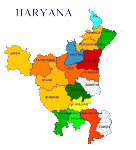Punjab Departmental Enquiries (Powers) Act, 1955 (PDF)

Act 8 of 1955
hl122
Received the assent of the Governor of Punjab on the 3rd May, 1955, and was first published in the Punjab Government Gazette Extraordinary, dated the 7th May, 1955.
| LEGISLATIVE HISTORY 6 |
| · Amended by Punjab Act 17 of 1958 |
An Act to confer certain powers on the officers conducting enquiries under the Punjab Civil Service (Punishment and Appeal) Rules.
Be it enacted by the Legislature of the State of Punjab in the Sixth Year of the Republic of India as follows:-
- Short title, extent and commencement.- This Act may be cited as the Punjab Departmental Enquiries (Powers) Act, 1955.
| Object & Reasons6 |
| Statement of Objects and Reasons. - "One of the important causes of delay in the conduct of departmental enquiries against Government Servants is the difficulty in securing the attendance of witnesses. At present the enquiring officer has no authority under the Punjab Civil Services (Punishment and Appeal) Rules, 1952, to compel the attendance of any witness and it frequently happens that witnesses are unwilling to appear in departmental proceedings. This Bill seeks to empower the enquiring officer or authority to compel the attendance of witnesses and the productions of documents in departmental proceedings on the same lines as in section 8 of the Public Servants (Inquiries) Act, 1850."
Punjab Government Gazette Extraordinary, dated the 22nd February, 1955 p. 106. |
- Summoning of witnesses and production of documents.- For the purposes of an enquiry under the Punjab Civil Services (Punishment and Appeal), Rules, [(or the Punjab Police Rules)], for the time being in force, the officer conducting such an enquiry shall be competent to exercise the same powers for the summoning of witnesses and for compelling the production of documents as are exercisable by a commission appointed for an enquiry under the Public Servants (Inquiries) Act, 1850 (Act (XXXVII of 1850), and all persons disobeying any process issued by such officer in this behalf shall be liable to the same penalties as if the same had issued from a Court.